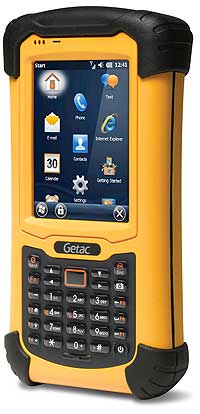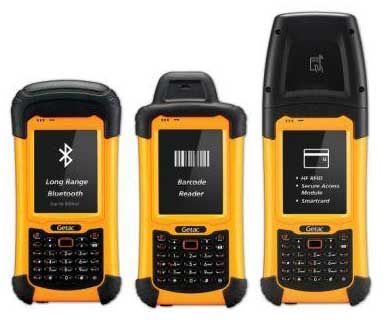On November 7, 2012, Getac announced their new PS336 rugged handheld computer in the United States.  Equal billing in the announcement took Getac's "Flexiconn" system of exchangeable end-caps that can add a variety of features to the computer, potentially eliminating the need for multiple devices.
Equal billing in the announcement took Getac's "Flexiconn" system of exchangeable end-caps that can add a variety of features to the computer, potentially eliminating the need for multiple devices.
If the PS336 looks familiar to those who follow the rugged handheld computing field, it's because the new device is a technologically updated and even tougher version of Getac's existing PS236. Visual differences include the new model's expanded keypad (29 vs. 22 keys) and the newly available end-caps.
Additional changes are inside where the PS336 benefits from a faster processor, more RAM and Flash storage, a higher resolution camera (5mp vs 3mp), and more advanced GPS. The PS336 also runs the latest available version of Microsoft's legacy mobile OS, Windows Embedded Handheld 6.5.
The biggest news, however, is those available Flexiconn end-caps. Exchangeable end-caps to add additional functionality without having to buy a different products is not new. But this is the first time Getac is making this approach available to their customers.
The lineup in the picture below shows the three available Flexiconn form factors. The one on the left adds either long-range Bluetooth or 13.56MHz RFID and a contactless Smart Card reader, the one in the middle a 1D barcode reader, and the one on the right a 3-in-1 card reader that combines RFID, Smart Card, and a SAM card slot (SAM stands for Security Authentication Module and is used to store cryptographic keys).

And below is what the currently available Flexiconn end-caps look like from the front:

Note that Getac introduced Flexiconn as an open system with an open interface, meaning that independent hardware vendors can create new modules and caps to expand functionality as required.
Now let's take a look at the underlying technology. First, Getac switched from the venerable Marvell PXA processor in the PS236 to a 1GHz Texas Instruments Sitara AM3715. Apparently, the PXA/XScale processors that dominated the handheld market for so many years first under Intel and then under Marvell have run out of steam (or Marvell is no longer interested in that market). Add twice the RAM and 8GB of iNAND Flash, GPS with the SiRFstar IV chipset (lower power consumption, quicker cold start, more accurate) and a possibly brighter display (600 nits), and we're clearly talking a faster, more powerful device. And Getac isn't neglecting legacy connectivity either; the PS336 still has a full DB9 RS232 serial port to communicate with the many field and testing peripherals that still use serial.
The keyboard, while still technically a keypad and not a full keyboard, probably allows for quicker operation with dedicated directional navigation keys and a large central orange button to easily access punctuation and the unit's seven function keys.
Despite all the new technology and functionality, the PS336 is even more rugged than the PS236. The new unit can handle repeated 6-foot drops and it carries IP68 certification, which means it's totally dustproof and also totally waterproof, even against full, extended immersion. The operating temperature range remains an impressive -22 to +140 degrees Fahrenheit. The extra ruggedness is especially impressive given the addition of the Flexiconn end-cap modules.
We're not sure if the PS336 will replace the PS236 or if they'll co-exist, with the PS336 filling the role as the high-performance, high-end expandable model, and the exiting PS236 becoming the entry-level offering. Be that as it may, with the PS336, Getac adds a rugged mobile computer that'll fill the needs of many field data collection, mapping and GIS applications that must fit into existing Microsoft infrastructures and require devices a whole lot tougher than a smartphone in a case.














